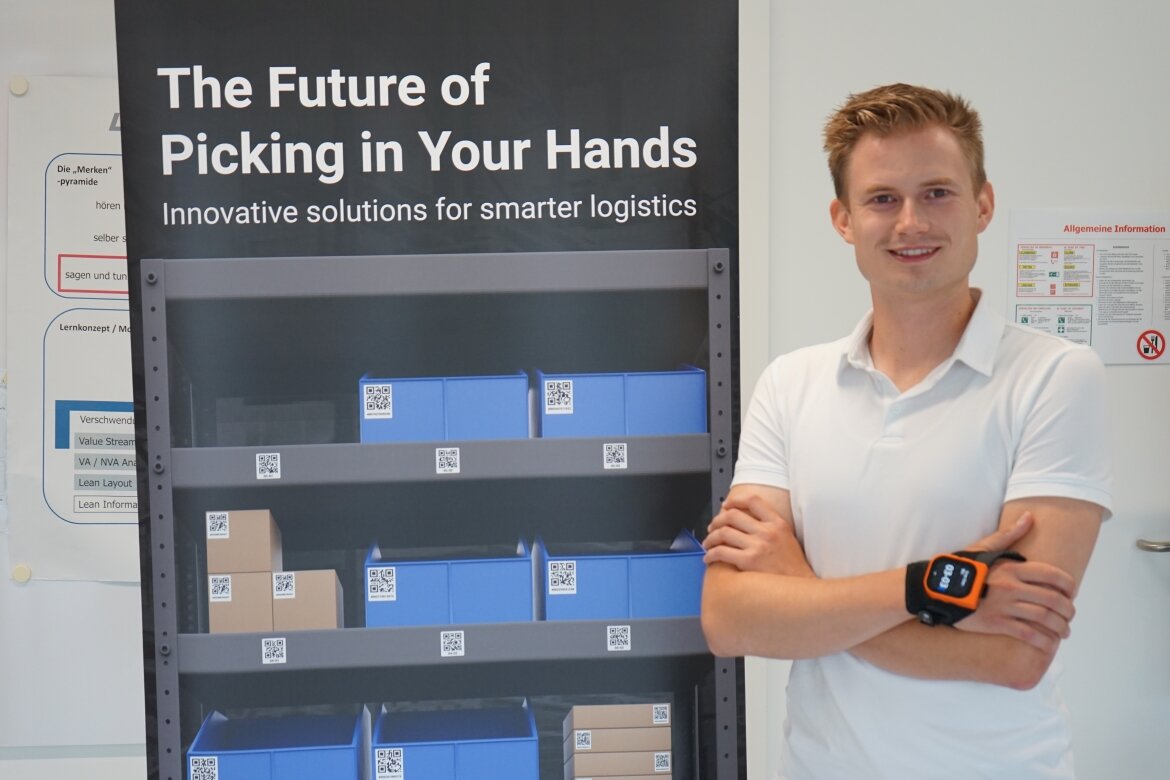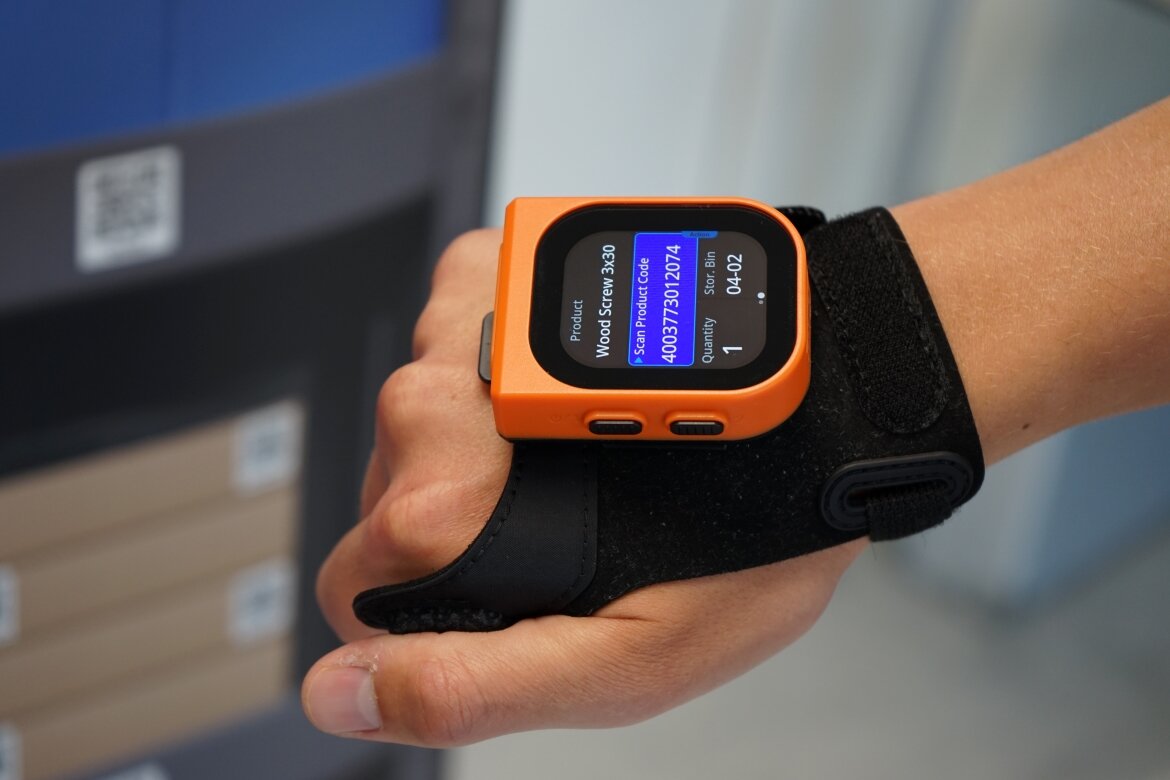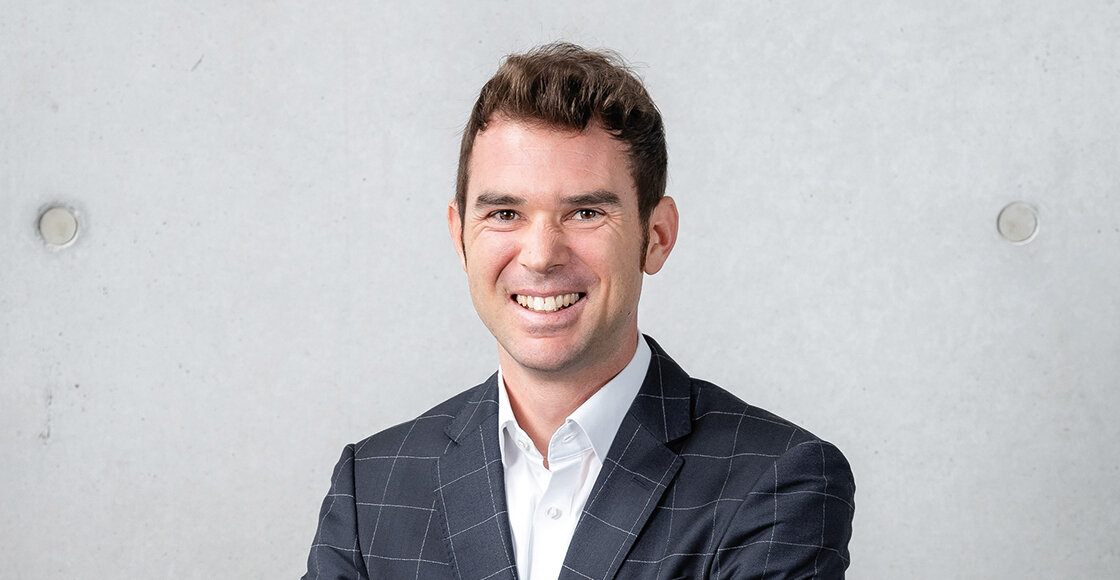Revolution on your wrist: ProGlove tested in the Lean Lab
- 03.10.2025
- General

Alexander Schiegl, graduate engineer (FH), with the ProGlove scanner in front of the rollup he developed himself, which simulates a realistic warehouse environment with boxes and cartons during tests and demonstrations.
How can smart scanner gloves be integrated into complex ERP systems? At the Lean Lab at Kufstein University, master's students experienced firsthand how wearables can revolutionize logistics processes—and why research and practice go hand in hand here.
Students enrolled in the Master's program in ERP Systems & Business Process Management at the University of Applied Sciences Kufstein Tirol learned how modern technologies can be seamlessly integrated into ERP systems during a workshop at the Lean Lab. The guest speaker was Alexander Schiegl, an employee at the Josef Ressel Center at the Kufstein University of Applied Sciences and founder of Schiegl Informatics FlexCo, who worked with Prof. Nico Deistler to set up a practical warehouse scenario.
The innovative scanner solution from the Munich-based company ProGlove was used for this purpose: the devices, which are worn on the back of the hand, enable hands-free working and direct data transfer to the SAP ERP system. This allowed the students to experience live how picking and goods receipt can be made more efficient and errors reduced.
Bridge between process and system
Schiegl also contributed his practical expertise: Integrating ProGlove scanners into existing SAP systems traditionally takes several months. However, with his company Schiegl Informatics FlexCo, founded in 2024, he has developed a solution that shortens this process to a few days, including synchronous display of data on the scanner display. This real-time connection between the scanner and SAP enables employees to work directly at the storage location without having to switch between the terminal and the workplace.
To demonstrate how this works in practice, Schiegl has also designed its own rollup: it shows a shelf with boxes and cartons, each of which has a barcode. This creates a realistic test environment in which the ProGlove scanners can be used as they would be in a real warehouse. This mobile setup is regularly used in demonstrations and workshops, allowing the potential of the technology to be experienced firsthand.

The ProGlove scanner in action: worn on the wrist, it reads barcodes directly and displays information in real time on the screen.
“During the workshop, a warehouse was recreated and this process was demonstrated. The students learned how processes within warehouse systems can be optimized and how different devices can be integrated into SAP for easier recording and transmission,” explains Deistler. The feedback was consistently positive – even the change of perspective from the traditional lecture hall to the Lean Lab made a noticeable difference.
In addition to his entrepreneurial activities, Schiegl conducts research at the Josef Ressel Center at the University of Applied Sciences Kufstein Tirol, where he focuses on topics related to artificial intelligence, particularly large language models. “This example illustrates how research and application intertwine at the Kufstein University of Applied Sciences: new technologies are not only explored theoretically, but also actively transferred into operational processes,” he emphasizes.
Theory meets practice in the Lean Lab
For Deistler, this practical approach is central to the program: “Theory provides the necessary understanding of complex business processes, data flows, and system architectures in ERP systems. It is only through practical application – for example, with innovative technologies such as ProGlove – that this knowledge becomes tangible, comprehensible, and anchored in the context of real business processes.”

Prof. (FH) Dr. Nico Deistler demonstrates how modern technologies can be integrated into ERP processes.
Workshops like this are part of the didactic concept in the Master's program in ERP Systems & Business Process Management. In addition to case studies directly in SAP and excursions to companies, such practical exercises ensure that students develop a deep understanding of processes and become familiar with current digital tools in a business context. In the Lean Lab in particular, real processes can be simulated and practical skills developed – from systems thinking and process understanding to technological competence.
This practical approach will be further expanded in the future: For the coming semester, for example, a visit to STIHL in Tyrol is planned, where students will discuss current challenges with the head of ERP systems. In addition, ideas from the annual SAP conference will be incorporated into the courses.
This makes it clear that at the University of Applied Sciences Kufstein Tirol, new technologies are not only dealt with theoretically, but are actively transferred into operational processes. The Lean Lab offers the ideal setting for this, and workshops with partners from the field make the training a realistic experience.
Links:
- ERP Systems & Business Process Management | bb
- Lean Lab | Info
- ProGlove | Website
